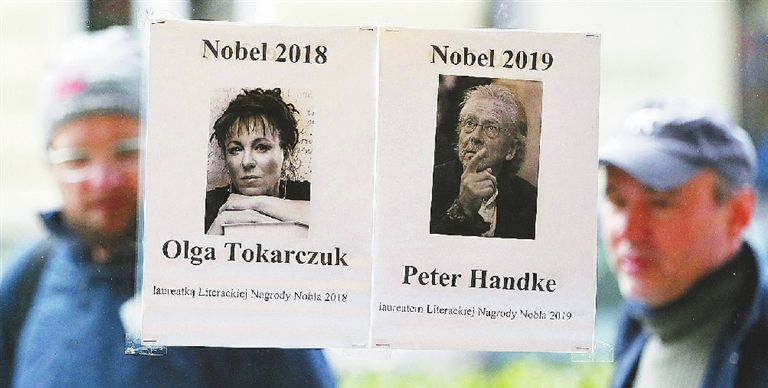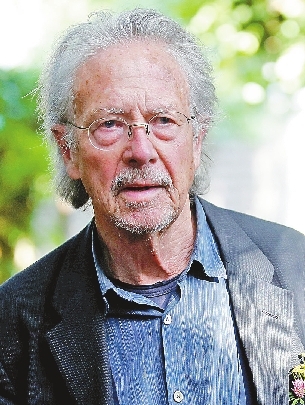


POLISH writer Olga Tokarczuk and Austrian author and playwright Peter Handke were announced as winners of the Nobel Prize in literature for 2018 and 2019 respectively on Oct. 10. The Swedish Academy made the announcement after delaying the award last year. Tokarczuk was awarded the prize for her “narrative imagination that with encyclopedic passion represents the crossing of boundaries as a form of life,” while Handke was rewarded for his “influential work that with linguistic ingenuity has explored the periphery and the specificity of human experience,” according to the Nobel’s official website. The result was not surprising to many Chinese literary insiders, because the two have long been familiar to Chinese literature lovers, especially Handke. The Chinese media have long suggested the writers as potential Nobel Prize winners. “It’s finally Peter Handke,” Jiang Fangzhou, a writer representing the voice of the younger generation of Chinese readers, said on social media. And Gao Xing, a researcher and literary critic with the Chinese Academy of Social Sciences, told Cover News, a Chinese online news provider, that Tokarczuk is the best Polish novelist alive: “She is capable of details of mental activities, and shows the utmost delicate, complicated and exquisite things to readers. She has a strong ability to touch readers deep down.” And Gao and peer critic Qiu Huadong both showed their respect for the strength and influence of Polish literature as a whole. While some expressed regret for Japanese writer Haruki Murakami not making the cut, they also showed an eagerness to read, or become better acquainted with the writing of the winning authors. Data from JD’s online bookselling section showed that sales of Tokarczuk’s novel “House of Day, House of Night” jumped by a factor of 600 in the first hour after the awards were announced, compared to the week before. Both writers have enjoyed connecting and interacting with their Chinese fans and peers during their visits to China. Many know Handke for his collaboration with director Wim Wenders in films like “Wings of Desire.” Theater director Meng Jinghui created a stage play “I Love XXX” to echo his 2008 view on Handke’s “Offending the Audience” and his deep appreciation for the author. Meng says Handke deserved a Nobel years ago. Debuting in 1966, “Offending the Audience” was Handke’s “anti-play” — a play with no plot and no storyline that relied on the language of insults and curses to engage with the audience. Meng experienced the play in New York, and decided to sit there alone after the play was meant to have finished. He shared an anecdote about it in Wuzhen, Zhejiang Province in 2016. “Two of the 28 performers left, I suppose they rushed to the metro, while the remaining actors sat in front of me continuing the ‘battle’ until their manager came,” Meng says. It was also in 2016 that Handke visited China for the first time. Talking about writing the play, Handke recalled how reluctant he was to attend the theater because his girlfriend at that time was an actress, adding that his reasons for writing the play was partly out of his preference as a book reader over joining a stage audience, and partly just to earn money. He says the play was “an analysis of the audience and performances, and projecting voices through language.” As Handke said in a 1970 interview, his “point was to use words to encircle the audience so they could free themselves through heckling.” Yet, as he stressed in his China visit, he was not that much of an experimental and avant-garde writer, because he regarded the play as a “classical” work in the style of Aristotle: “So, in this sense, I’m a writer in the classical tradition.” Hu Wei, who teaches and studies German language and literature at Peking University, says that Handke “is a legend and a misfit who doesn’t readily belong to anything.” “I’m always breaking rules or boundaries,” Handke said during his visit. Born in 1942 in Austria to a Slovenian mother, he was closer to his mother’s family growing up. His mother’s suicide cast a heavy shadow over him. In 1972, he created “A Sorrow Beyond Dreams: A Life Story,” a semi-autobiographical novella based on her life. A former law major, he told a Chinese audience during an interview that the language of law offers him a conduit to objective and retrospective thinking. “Even at my age, I feel writing is no easy or natural thing. It’s always an adventure,” he says, adding that he regards himself as an amateur writer but a professional reader. “I might be a statue of Buddha as a reader, but I’m a snail as a writer.” He has read extensively since a young age. William Faulkner and Fyodor Dostoevsky are his most important literary influences. His early reading also included Chinese classics, and he was frank about telling the local audience that had taken time to read several Chinese titles before arriving in the country. “I agree with Lao Tze and his philosophy that writing is not meant to be tangible or fixed, and that it is better to be like water,” he says. He also says Lao She’s writings are interesting and have a historic precision. “He was a great chronicler and the writer I hope to become.” Tokarczuk’s publisher arranged a literary event in Beijing in 2018, the year she won the Man Booker award for her novel “Flights.” When she was talking about her novel “House of Day, House of Night” — a magical story about dreams and folktales — at the event to promote its Chinese-language release, the organizer suggested the audience bring paper slips with their dreams written on them to give to Tokarczuk. On a previous visit to China in 2008, the Polish novelist visited the house and workplace of her translator Yi Lijun, who is with the Beijing Foreign Studies University. Yi, 85, recalls that Tokarczuk was of her own daughter’s age, and they talked widely on topics about China and literature. Born in 1962, Tokarczuk is an experienced psychologist who was trained at the University of Warsaw. Her works touched Chinese writer Li Tang, who praised her ability to “present new and boundless possibilities.” An analysis by The Paper, a Chinese online news platform, says the awards for Tokarczuk and Handke demonstrate the Nobel committee’s aim to embrace the non-English language writing world, where the authors are rewarded for discussing fresh and relevant topics. “But looking at the outcome, it seems that they are still sticking to European writers, maybe too much?” the editorial quizzed. “Yet it is still a brave decision, because Handke had previously said that the prize attracted reams of news reports, but does nothing good for the people who really care about reading literature.” (China Daily) | 
